- Home
- Perry Rhodan
The Fleet of the Springers Page 7
The Fleet of the Springers Read online
Page 7
'Assignment' was the translation of an Arkonide concept which actually meant 'registration of command frequency.' It had to be determined which one of the five who had occupied the destroyer was entitled to give orders to the robot as the last instance.
Under different circumstances Hifield would have been the first to come forward to exchange the code words with the robot which were necessary for RB-013 to recognize his new commander under any and all circumstances. But the despair of the protracted flight, the catastrophic landing and the icy desolate surroundings had subdued his egomania to such a degree that he did not even raise objections when Tiff stepped up to the robot.
"Cadet Tifflor," Tiff announced. "Julian Tifflor. The squared number of Schrödinger's wave function psi gives the probable density of the observed particle."
And RB-013 replied: "By multiplication with the position vector the expected value for the position and by multiplication with the impulse vector the expected value of the impulse."
Of course the procedure was rather ludicrous. The point was not that one wanted to give new information to the other nor that the statements were correct. The exchange of messages had been agreed on before as code. The sentence enabled the positronic data bank of the robot to register the basic frequencies of the human voice whereas his reply reassured Tiff that the robot was in perfect condition. The data bank holding the key to the answer was connected with the main control of the machine which would have prevented revealing the code if anything had been wrong with the robot.
"Very good," Tiff said. "Now we've got that cleared up."
Tiff turned around. just then it seemed to dawn on Hifield that someone else had elected himself commander and he begrudged it. Tiff saw his complaints coming and quickly tried to forestall them: "We're all agreed," he stated, "that we need first of all a shelter, don't we? The emergency rations in the cabin will last us for two years. We've got 500 hours to find a hole we can crawl in and store our supplies."
"We don't know what elements this atmosphere consists of. It's not impossible that what we think is snow is in reality paraffin and that the 'air' is carbohydrate.
"What we must look for is a cave which we can make airtight and livable with our means. RB-013 will help us with it but first we'll have to find a cave."
Hifield had an idea. "Why don't we use the destroyer?"
Tiff made a declining gesture. "Can you make it airtight again? Furthermore, it's the only metallic object around here and the engines still radiate a little. If some of the Springers are still hanging around the neighborhood and get the idea of looking for us on this planet, they're bound to find the machine at once. That's why we don't use the destroyer."
RB-013 with his long spindly legs and four arms—the two lower ones nothing more than movable cannons trotted through the snow to check his mobility.
Tiff addressed the robot. "We must leave this place," he told him. He looked once more at the skidmark the destroyer had made and determined the direction. "It'll be best to go that way." He pointed toward the darker area he had seen before they went down.
"Yes, sir!" RB-013 replied. And his voice almost sounded human.
• • •
Orlgans opined: "They're very strong but not as powerful as the fleet that'll soon show up."
"On the other hand, they didn't wait for them. Our fleet can't catch them now."
Orlgans gave no answer since Ornafer was right. First the warships he had summoned to help him had vanished from the screen and then the three light spots of the strange vessels. All that was left behind were the two wrecks. The Orla XI had already put a great distance between itself and the constellation but its sensitive measuring instruments still registered the distortion of the gravitational field of the system deriving from the two demolished ships.
"They've planted time-bombs," Orlgans said. "I'd like to know how these barbarians managed to dodge them."
Ornafer didn't know either. Orlgans was lost in thought for awhile. When he lifted his big, long-haired head again, Ornafer saw his firm mouth twisted into a sly smile. "How long, would you say, will it take our battle fleet to return?" Orlgans asked him.
Ornafer pondered the question. "Four or five hours, I believe."
Orlgans was inclined to agree. "At least, if not longer. Connect me with the rangefinder."
The request came as a surprise to Ornafer. He grimaced and called the rangefinder on the hypercom.
Orlgans stepped over to the screen when the man appeared. "Let me have all navigating data on the course of the little ship that left the K-7 after it escaped from us."
The rangefinder complied with the demand and a few minutes later Orlgans received the desired data plotted on a sheet of graph paper. Together with Ornafer he began to study it.
"You see!" Orlgans explained, connecting the various measuring points on the co-ordinates with a line as best he could. The positions of the two suns and the four planets were also recorded at the time of the measurements and were shown in colored outline.
The time was noted at each point.
Whatever one could say about Ornafer, nobody could deny that he was an excellent astrogator. The diagram was not very difficult for him to read and he quickly grasped what Orlgans was getting at.
"Yes, I see," Ornafer answered. "The little machine has reached the vicinity of the system's second planet."
Orlgans laughed for the first time in hours. "Exactly! And if we've to wait four or five hours for the return of the battle fleet, we might as well try to find the aliens in the meantime."
He rolled up the diagram and went to the intercom to issue the order to start. He stopped halfway and looked over his shoulder at Ornafer. "Would you prefer to leave the booty to others?"
"No!" Ornafer declared categorically.
• • •
Rhodan's three ships hovered motionlessly in space at a distance of eight light-years from the two suns. Rhodan was almost certain that the two disturbances caused by the transition— one by going into hyperspace and the other by leaving it—were registered only as a single occurrence because of the short time interval involved. Let the Springers try to figure it out when their instruments registered the second disturbance! He doubted very much it would occur to the Springers that the three heavy ships had performed a transition across a distance of no more than eight light-years.
Rhodan waited, prepared to intervene in the imminent developments with all his might.
• • •
It was nothing at all for the robot to carry the two girls on his strong upper arms, as Tiff had arranged. He was convinced that Mildred and Felicita were on the verge of collapsing although they were loath to admit it. Even with the girls on his arms the robot marched at such a fast clip that the three cadets had trouble keeping up in the deep snow. Tiff asked the robot to slow down.
After a march of five hours Tiff decided to stop and rest. RB-013 stood still and set down the girls. Eberhardt made a dugout in the snow where the girls could stretch out and relax. RB-013 was in a standby position. The sack with the provisions they had taken along from the destroyer swayed slightly in the wind.
Hifield turned to Tiff and looked him straight in the eye. "I'm not tired," he said. "I can go on."
Tiff knew that the time had come for the showdown which he had been expecting. "Go ahead!" he replied calmly.
But Hifield didn't go. At least not in the direction in which they had been marching. Instead he went up to Tiff and planted himself in front of him. "You'd like to get rid of me, eh?" he challenged, full of hate.
Tiff, who was about to sit down in the snow, acted not the least perturbed. "No," he replied simply.
But there was no stopping Hifield now. He put his arms on his hips and fumed: "No? How nice of you! After promoting yourself to commander on your own authority you can afford to show a little tolerance toward your comrades, can't you?"
The altercation was carried on over the helmet radio. Eberhardt could hear it as well as
the robot. The two girls had fallen asleep. Eberhardt got up and moved closer. Tiff motioned him with his hand without Hifield noticing it. Eberhardt stood still.
Tiff looked at Hifield earnestly. "To begin with," he remonstrated in a sharp tone, "I've not set myself up as commander, I've merely acquainted the robot with my voice. It's immaterial whether we five are a democratic unit or not, the robot will listen to one voice only. And secondly..." Tiff's voice became softer and more urgent, "...I want to give you a bit of advice: Keep your silly mouth shut! Your nerves are shot, that's all."
Hifield's eyes bulged. "Oh no!" he laughed scornfully. "You mean, whoever doesn't agree with your opinionated self-righteousness has a case of nerves." He assumed a menacing stance and taunted Tiff again. "Now let me tell you something! If you dare open your big mouth once more without asking us first"— now he raised his clenched fist—"I'll break your faceplate. We don't need any dictators!"
Tiff realized he had to meet the challenge head-on. "Listen, Hifield!" he shot back unhesitatingly. "I herewith open my mouth without asking you first and I'm calling you a childish and stupid bully. Now, go ahead and break my faceplate!"
He didn't have to invite Hifield twice. He leaped the three feet separating him from Tiff in a flying tackle. Tiff saw him coming and instantaneously ducked to the side grabbing Hifield's leg as he sailed past. He was pulled along and fell into the snow with Hifield. He let go of Hifield's leg and grasped him around his back.
Hifield lay still as Tiff squeezed.
"You see, Hifield," Tiff said calmly, "it's very simple. All I have to do is move my finger half an inch and press the contact firmly to make your helmet and spacesuit pop open. You know that, Hifield, don't you? And if the atmosphere isn't poisonous, you'll freeze to death—fast. Minus 170° F.—remember, Hifield?"
Tiff suddenly loosened his grip and jumped to his feet. "And now," he growled, "keep your mouth shut and behave. The next time I'll press the contact. In our tight spot we can't afford to let you soothe your bruised self-conceit at our expense."
Hifield remained on the ground without moving. He sobbed: "You should've pressed it... I no longer want to..."
He was interrupted. Interrupted by a voice which seemed totally unaffected by the events of the last few minutes.
It was RB-013 announcing in a low monotonous voice: "Foreign object, sir! 4000, phi 28, theta 67."
At that moment Hifield faded into the background,
"What kind of an object?" Tiff inquired hastily.
"Spherical, metallic, sir!" RB-013 replied with irritating calmness. "Diameter about 30 feet."
A minute later RB-013 came through with a new report: "R 3800, phi no change, theta lower."
The thing—whatever it was—descended.
Mildred and Felicita got tip sleepily. Meanwhile Tiff had regained his composure. "We'll wait and see," he declared. "As long as the thing keeps its distance it's presumably not tailing us. RB-013!"
"Yes, sir?"
"Disintegrator and thermo-gun at the ready!"
"Yes, sir!"
Tiff smiled. He looked at his comrades one by one to let them see that he was smiling. "Easy does it," he said softly.
• • •
Orlgans had located the destroyer on the first try. He had stopped his ship at an altitude of 600 miles. Springer ships were not designed for regular landing. Although they could be set down, a Springer captain was usually reluctant to do it and touched down only in an emergency. Instead he had sent out several small auxiliary ships.
The auxiliary ships reported that the destroyer had been wrecked and abandoned. One of the ships informed him that it had found something believed to be a track. Orlgans called the other ships back and ordered the one to follow the trail.
The little ships were manned by two people who were in constant communication with the Orla XI The two men in the ship taking up the pursuit were Mernok and Paradicsom. If the ranks of the Springer fleet had had the same titles as on Earth, Paradicsom. would have been called a lieutenant and Mernok a sergeant.
"I hope the wind hasn't blown away the track," Paradicsom. murmured. He flew higher and studied the observation screen on which the trail stood out as a dark line against the surroundings.
"I don't believe it did," Mernok answered, setting the course.
The little machine moved south at a leisurely pace. From time to time Paradicsom called out that he had lost the trail and Mernok turned around in a tight circle to return to the place where they had seen the track last and to pick it up again. In this manner they didn't make as much progress as they wished but they knew the fugitives were on foot and hadn't the slightest doubt they would catch up with them the same day. As far as the Springers knew, the planet rotated on its axis once every 31 hours and it was now 3:00 o'clock in the afternoon.
• • •
Orlgans contemplated whether or not to call his clan for help. Up to now he had been reluctant to talk about it with Ornafer. He would have laughed at him. Of course at times it seemed ridiculous to Orlgans why he worried so much about a little destroyer which had crash-landed and a crew marching on foot to reach a warmer region. But his troubles were real and he couldn't talk himself out of them.
For instance it made Orlgans highly suspicious that the little craft had never shown any intention of turning around and seeking refuge in one of the three larger spaceships. Orlgans didn't know that the destroyer had lost most of its energy from the bombardment and no longer had the alternative of turning back. For this reason, he surmised that landing on this world of ice and snow was a cunning trick and he had the impression that it would be far from simple to apprehend the fugitives again. If he called in his clan with the patriarch Etztak and his gigantic ship in the lead, he would have to share the spoils with the other captains of the Orlgans clan, but on the other hand he could be sure of the gain.
What if he acted alone?
How do I know, Orlgans weighed in his mind, whether there is anything at all in it for me?
Earlier he had taken it for granted that Tifflor was among the men who had descended to the planet. But was it really the case?
Perhaps it's not irrefutable but it's at least plausible, Orlgans thought.
Yet everything hinged on Tifflor. Orlgans would have turned his back on this world immediately if he had known that Tifflor were not among the fugitives.
Because Tifflor was the man who, according to Orlgans' information, knew the well-guarded secret concerning the location and mysteries of the World of Eternal Life about whose existence the legends had told so persistently for 10,000 years that no reasonable man could doubt them. Orlgans was well aware that the strangers had knowledge of the World of Eternal Life and probably had already visited it. He further believed that his erstwhile prisoner Tifflor held the key to the riches which had induced Orlgans to undertake this venture.
Information about the position of that legendary world in the Galaxy was a prize great enough to be shared with the other captains of the Orlgans clan, if necessary. Nevertheless, for the time being he decided to wait for the report of the search ship he had dispatched and to send out his call for the clan only if it became obvious that the matter was too much for him to handle alone.
• • •
Wanderer was the name given by Perry Rhodan to that artificial world where the substance of consciousness from a physically long extinct race had formed a mental collective being of incredible powers.
Everybody in the Galaxy—with the exception of races who had not yet mastered space travel—knew about the existence of this world. Yet nobody knew its location.
Nobody but Rhodan!
Rhodan had discovered the world and had been granted permission by The Brain to undergo the cell-conservation which, if renewed every 62 years, meant eternal life. He also had been given the right to select worthy earthlings to receive the same treatment.
The cell-conservation was no charm against bullets and rayshots but it arrested completely the
aging process.
Rhodan had obtained nothing more than the cell-shower treatment on his first and only visit to Wanderer. But he knew that the artificial world harbored many more secrets, secrets of such advanced technological nature that its possessor was assured absolute superiority in space.
Rhodan always entertained the thought of returning to Wanderer to seek permission to benefit from its miracles of technology. Much to his regret it had remained but a thought. For the present far more urgent matters required his attention.
• • •
Mernok was startled. He glanced at Paradicsom, who had as yet noticed nothing; he kept staring at the sensor screen. Mernok studied the picture on the microwave rangefinder a second time. The object slowly moved toward the center of the screen.
Metal!
He carefully examined it as he was wont to do. The presence of metal was not necessarily connected with the fugitives. It was not unthinkable that a metallic vein had cropped up in this deserted world.
On the other hand, however...!
Mernok called Paradicsom's attention to his discovery. Paradicsom. was far more impulsive than Mernok. Without hesitation he shouted:
"Let's drop right down!"
6/ Paradicsom's Predicament
"Theta is approaching zero..." RB-013 said slowly. "...Zero!" The robot seemed to listen a few more seconds. "Movement has ceased," he finally stated. "Distance 3200, phi M." RB-013 stood where the direction from which they had come was phi zero. The angle was measured clockwise. Therefore, the unknown object was, when looking back to the right of their track. It had been ascertained by the robot that the object in question must have been produced by intelligent beings, because he recognized its shape as a flat ellipsoid.
Tiff remembered having seen such little auxiliary ships on the Orla XI. He no longer could doubt that it was one of those vessels. Somebody was on their heels. The robot's sensor and rangefinder instruments had a range of about six miles for the sensor and 90 for the rangefinder. However the range was restricted by the curvature of the horizon and by uneven features of the ground. It was therefore difficult to determine how many of these lentil-shaped vehicles were in the neighborhood. But there was probably only one. "Let me know when anything moves!" Tiff instructed the robot. Then he turned to Hifield and Eberhardt. "Here's our chance," he said dryly. "The only question is, how can we approach the thing without being detected." Hifield remained silent. His head was lowered and he looked at the ground.

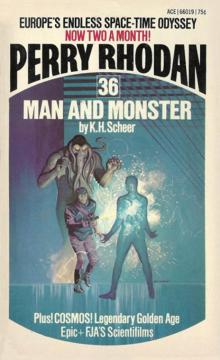 Man and Monster
Man and Monster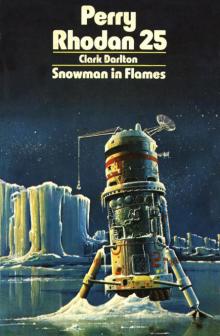 Snowman in Flames
Snowman in Flames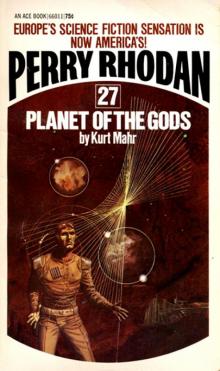 Planet of the Gods
Planet of the Gods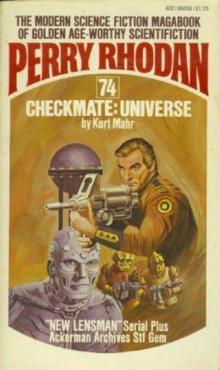 Checkmate Universe
Checkmate Universe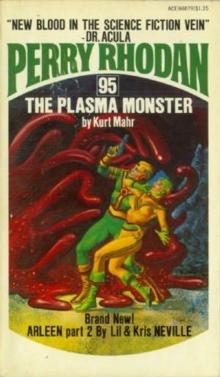 The Plasma Monster
The Plasma Monster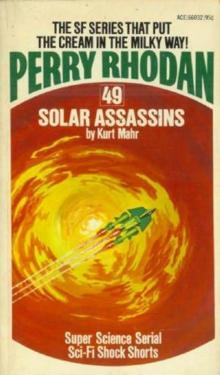 Solar Assassins
Solar Assassins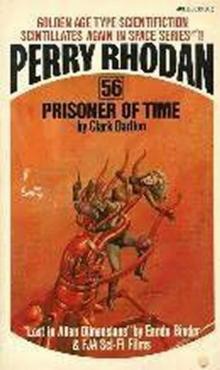 Prisoner of Time
Prisoner of Time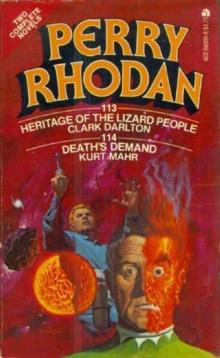 Death's Demand
Death's Demand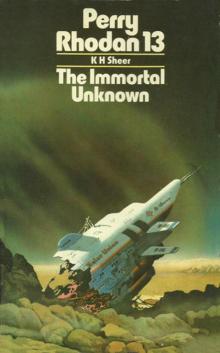 The Immortal Unknown
The Immortal Unknown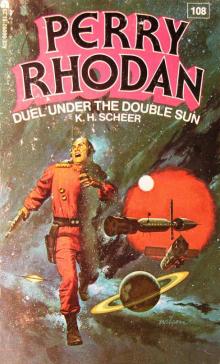 Duel Under the Double Sun
Duel Under the Double Sun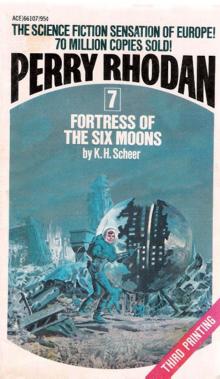 Fortress of the Six Moons
Fortress of the Six Moons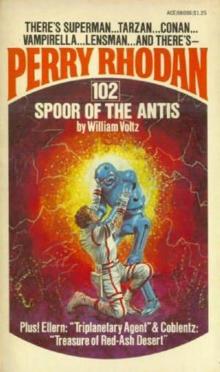 Spoor of the Antis
Spoor of the Antis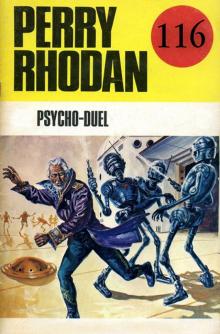 The Psycho-Duel
The Psycho-Duel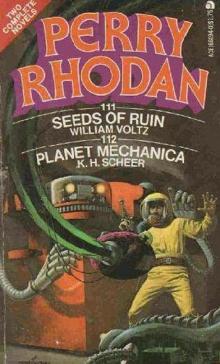 Planet Mechanica
Planet Mechanica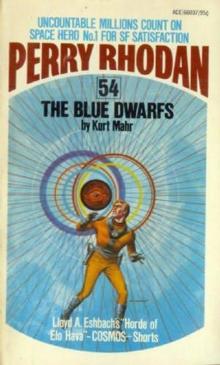 The Blue Dwarfs
The Blue Dwarfs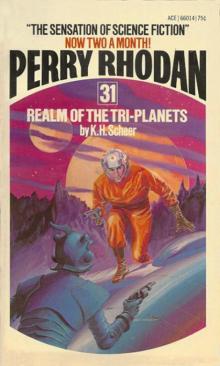 Realm of the Tri-Planets
Realm of the Tri-Planets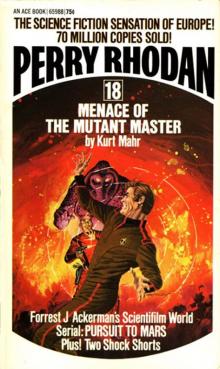 Menace of the Mutant Master
Menace of the Mutant Master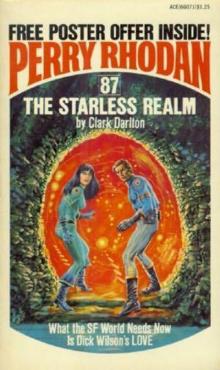 The Starless Realm
The Starless Realm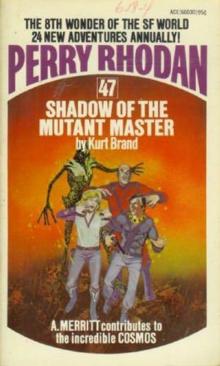 Shadow of the Mutant Master
Shadow of the Mutant Master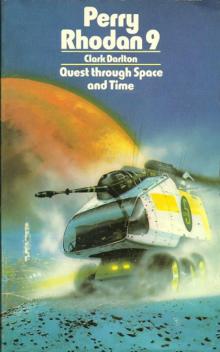 Quest Through Space And Time
Quest Through Space And Time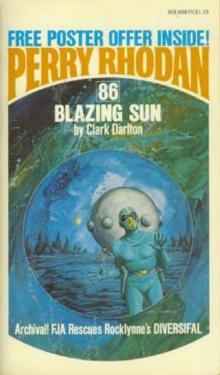 Blazing Sun
Blazing Sun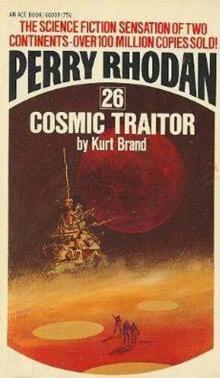 Cosmic Traitor
Cosmic Traitor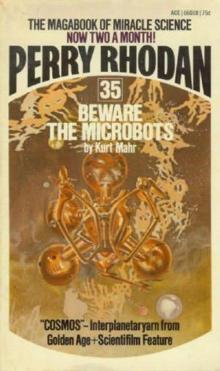 Beware the Microbots
Beware the Microbots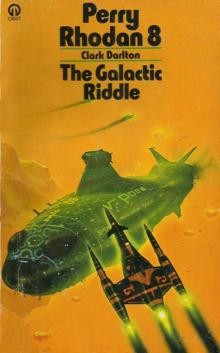 The Galactic Riddle
The Galactic Riddle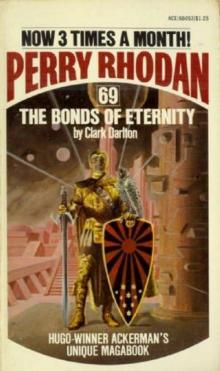 The Bonds of Eternity
The Bonds of Eternity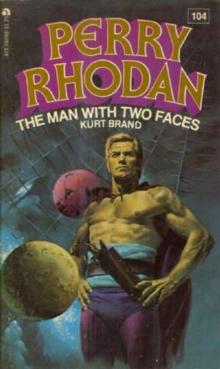 The Man With Two Faces
The Man With Two Faces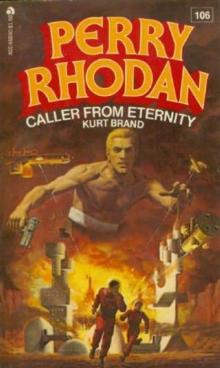 Caller from Eternity
Caller from Eternity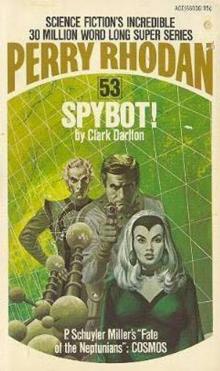 Spybot!
Spybot!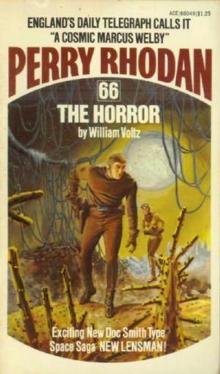 The Horror
The Horror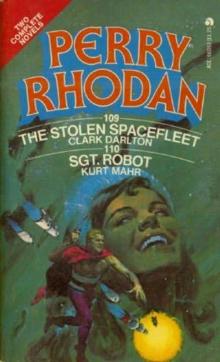 The Stolen Spacefleet
The Stolen Spacefleet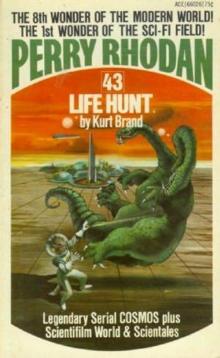 Life Hunt
Life Hunt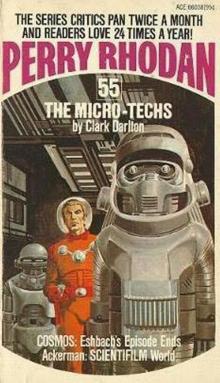 The Micro-Techs
The Micro-Techs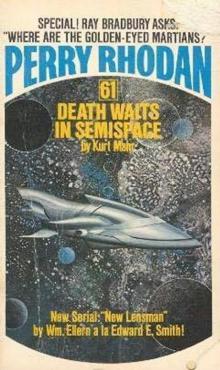 Death Waits in Semispace
Death Waits in Semispace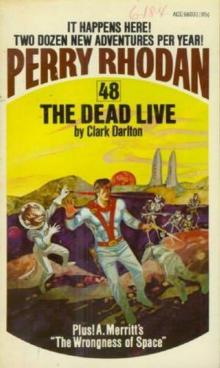 The Dead Live
The Dead Live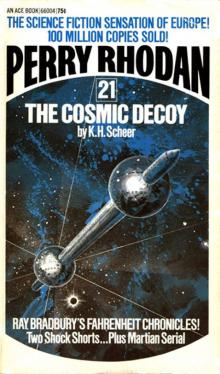 The Cosmic Decoy
The Cosmic Decoy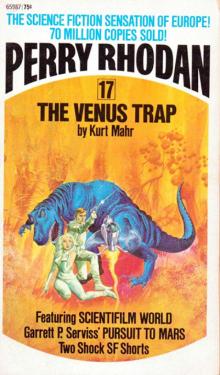 The Venus Trap
The Venus Trap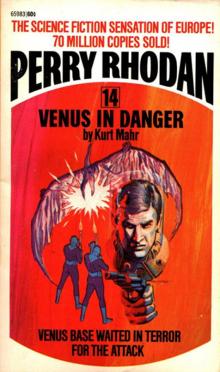 Venus in Danger
Venus in Danger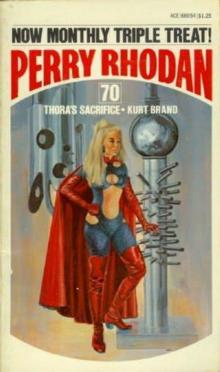 Thora's Sacrifice
Thora's Sacrifice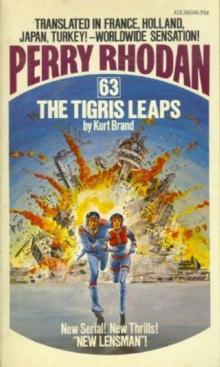 The Tigris Leaps
The Tigris Leaps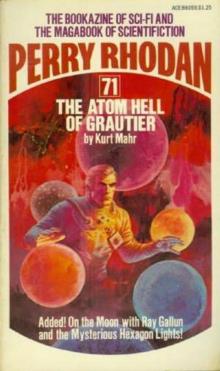 The Atom Hell of Grautier
The Atom Hell of Grautier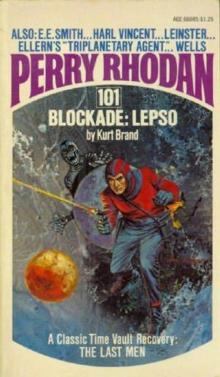 Blockade: Lepso
Blockade: Lepso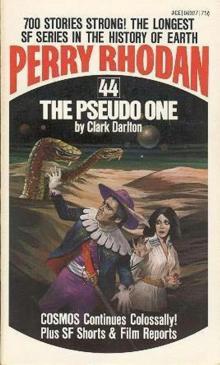 The Pseudo One
The Pseudo One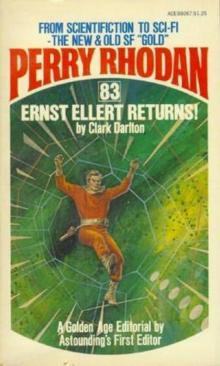 Ernst Ellert Returns
Ernst Ellert Returns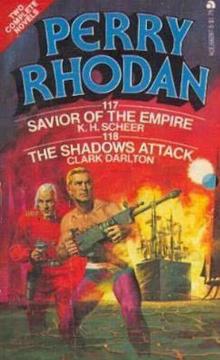 Savior Of The Empire
Savior Of The Empire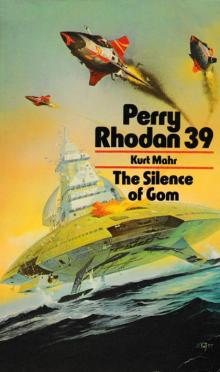 The Silence of Gom
The Silence of Gom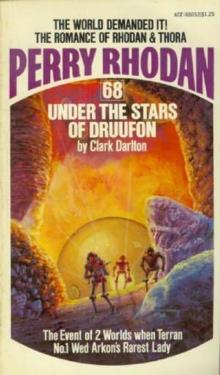 Under the Stars of Druufon
Under the Stars of Druufon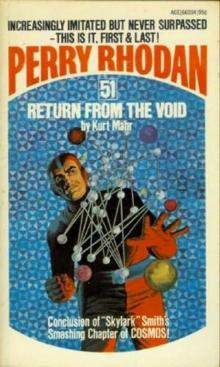 Return from The Void
Return from The Void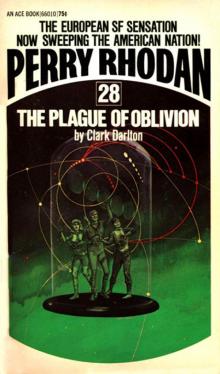 The Plague of Oblivion
The Plague of Oblivion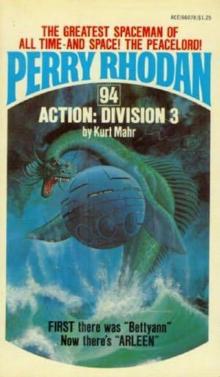 Action Division Three
Action Division Three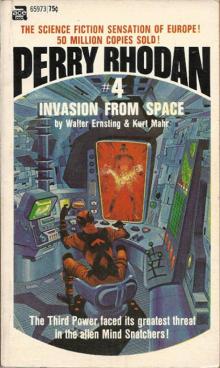 Invasion From Space
Invasion From Space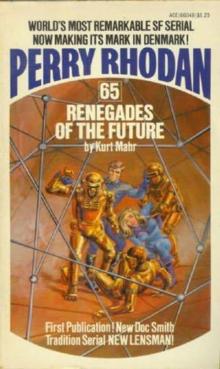 Renegades of the Future
Renegades of the Future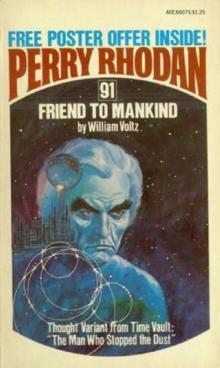 Friend to Mankind
Friend to Mankind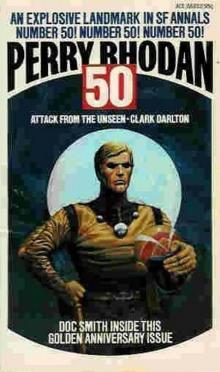 Attack from the Unseen
Attack from the Unseen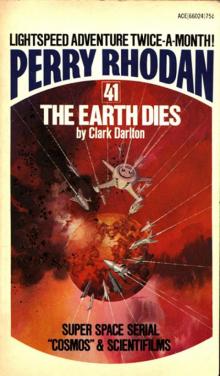 The Earth Dies
The Earth Dies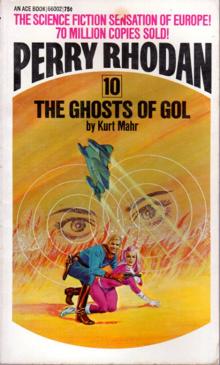 The Ghosts of Gol
The Ghosts of Gol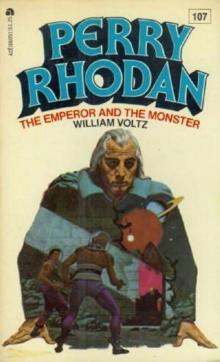 The Emperor and the Monster
The Emperor and the Monster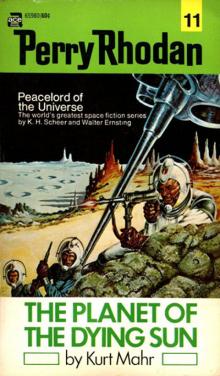 The Planet of the Dying Sun
The Planet of the Dying Sun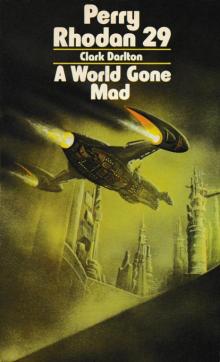 A World Gone Mad
A World Gone Mad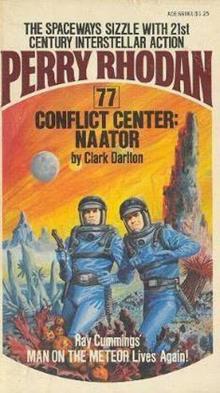 Conflict Center Naator
Conflict Center Naator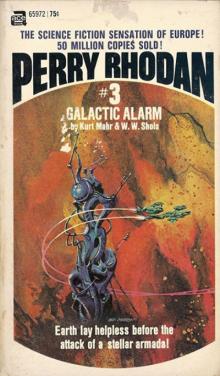 Galactic Alarm
Galactic Alarm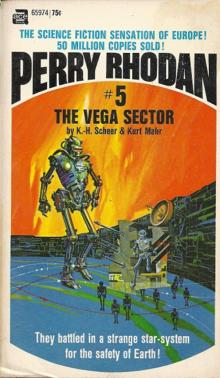 The Vega Sector
The Vega Sector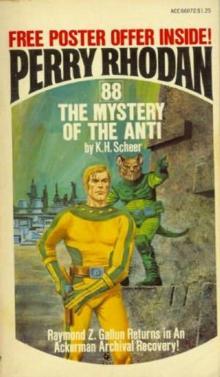 Mystery of the Anti
Mystery of the Anti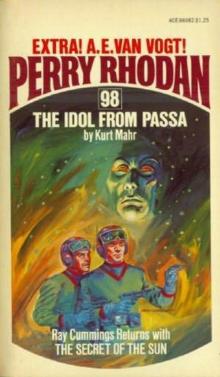 The Idol from Passa
The Idol from Passa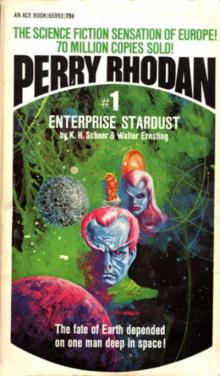 Enterprise Stardust
Enterprise Stardust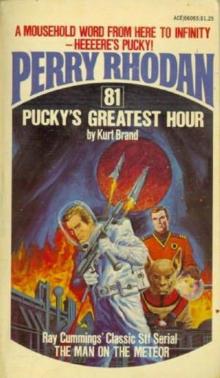 Pucky's Grestest Hour
Pucky's Grestest Hour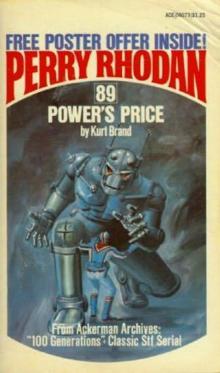 Power's Price
Power's Price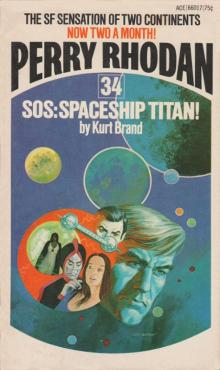 SOS Spaceship Titan
SOS Spaceship Titan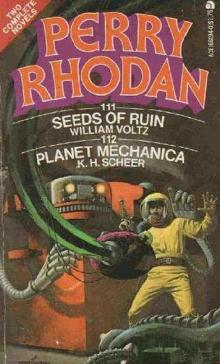 Seeds of Ruin
Seeds of Ruin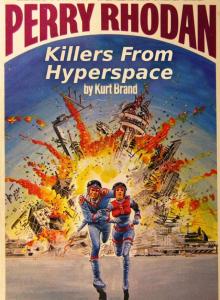 Killers From Hyperspace
Killers From Hyperspace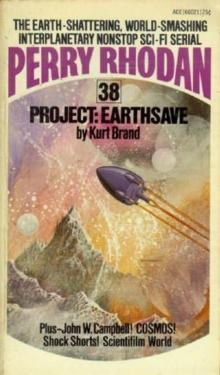 Project Earthsave
Project Earthsave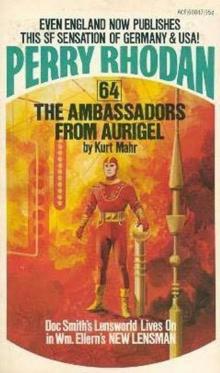 The Ambassadors from Aurigel
The Ambassadors from Aurigel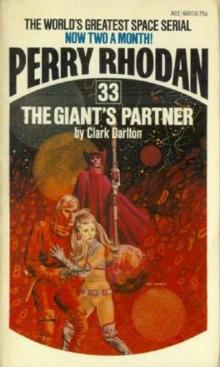 The Giant's Partner
The Giant's Partner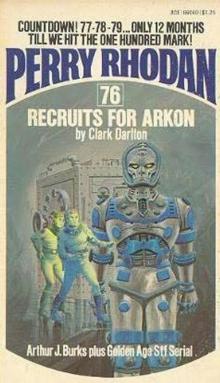 Recruits for Arkon
Recruits for Arkon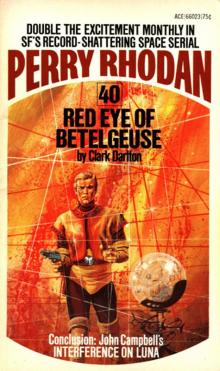 Red Eye of Betelguese
Red Eye of Betelguese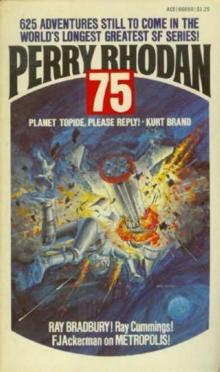 Planet Topide Please Reply
Planet Topide Please Reply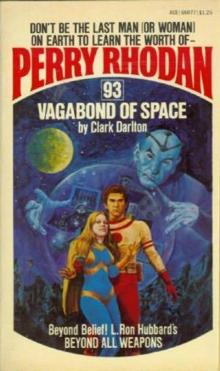 Vagabond of Space
Vagabond of Space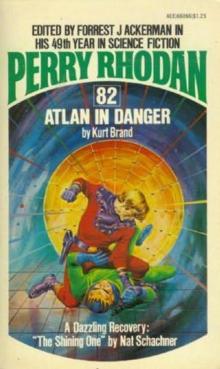 Atlan in Danger
Atlan in Danger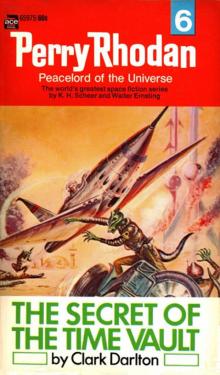 The Secret of the Time Vault
The Secret of the Time Vault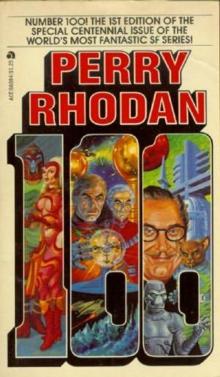 Desert of Death's Domain
Desert of Death's Domain Saboteurs in A-1
Saboteurs in A-1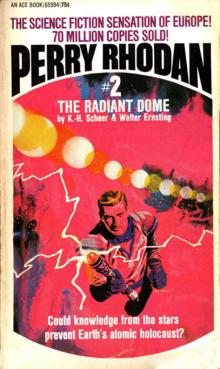 The Radiant Dome
The Radiant Dome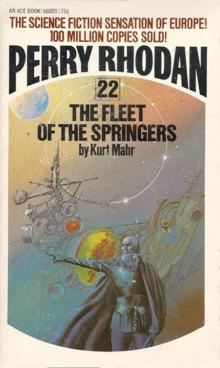 The Fleet of the Springers
The Fleet of the Springers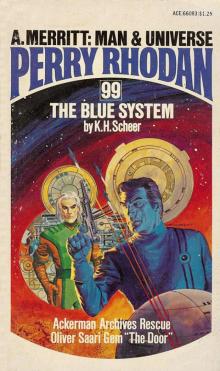 The Blue System
The Blue System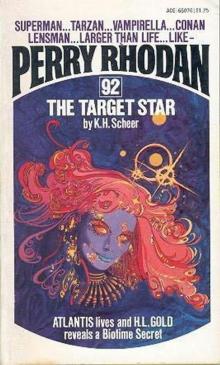 The Target Star
The Target Star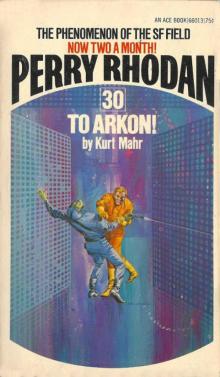 To Arkon!
To Arkon!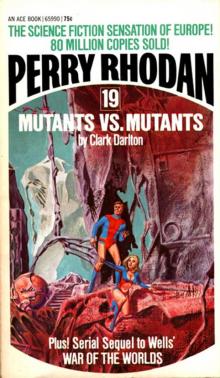 Mutants Vs Mutants
Mutants Vs Mutants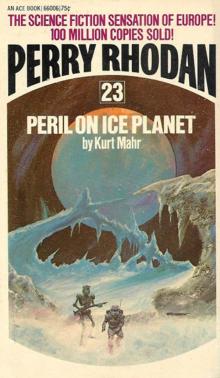 Peril on Ice Planet
Peril on Ice Planet Horn: Green
Horn: Green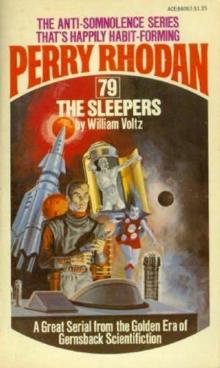 The Sleepers
The Sleepers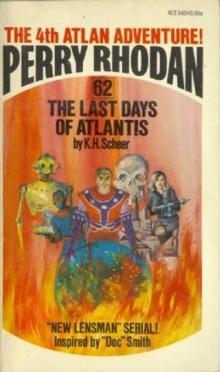 The Last Days of Atlantis
The Last Days of Atlantis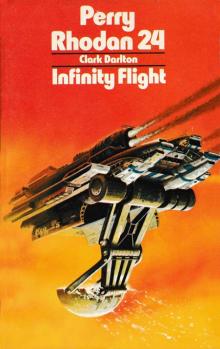 Infinity Flight
Infinity Flight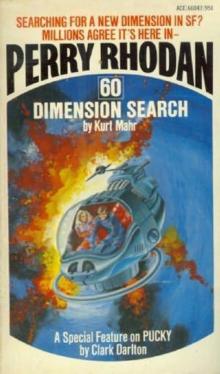 Dimension Search
Dimension Search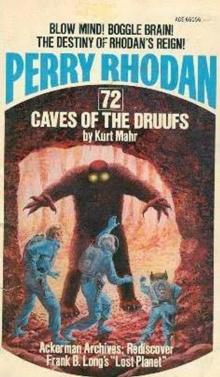 Caves of the Druufs
Caves of the Druufs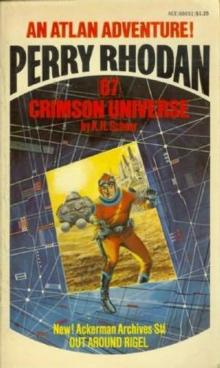 Crimson Universe
Crimson Universe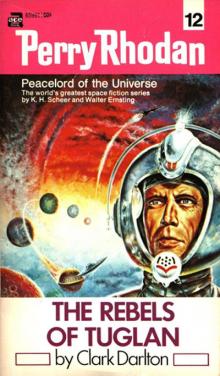 The Rebels of Tuglan
The Rebels of Tuglan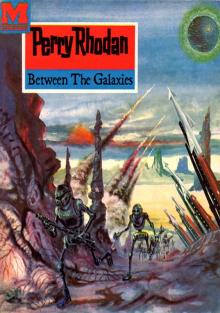 Between The Galaxies
Between The Galaxies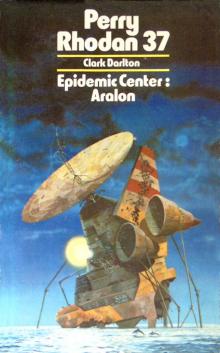 Epidemic Center Aralon
Epidemic Center Aralon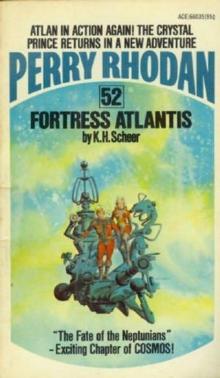 Fortress Atlantis
Fortress Atlantis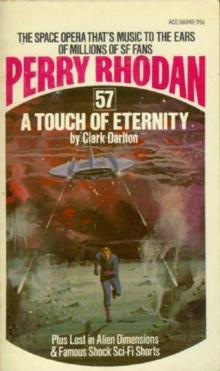 A Touch of Eternity
A Touch of Eternity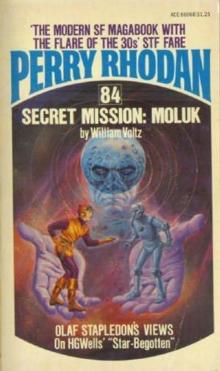 Secret Mission Moluk
Secret Mission Moluk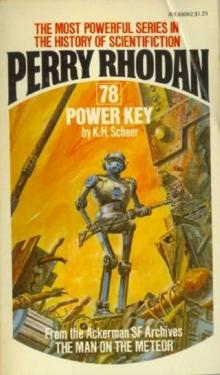 Power Key
Power Key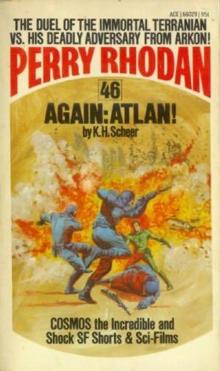 Again Atlan
Again Atlan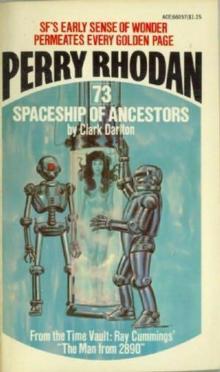 Spaceship of Ancestors
Spaceship of Ancestors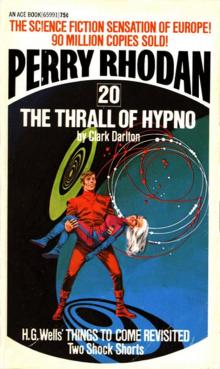 The Thrall of Hypno
The Thrall of Hypno